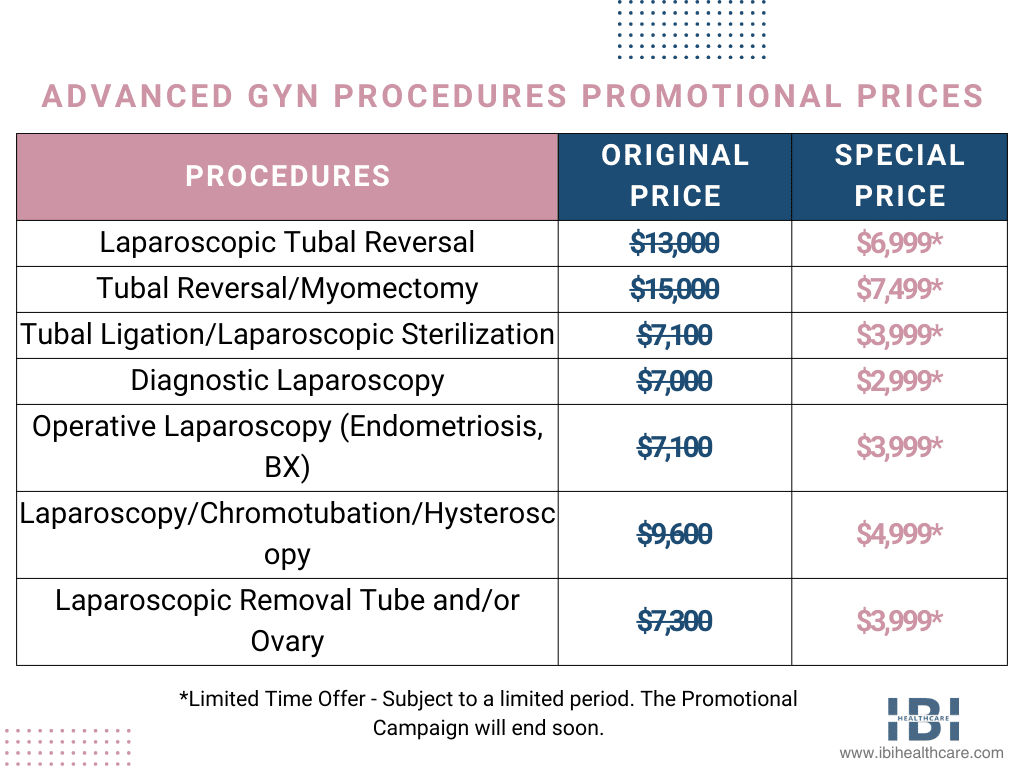What is Tubal Ligation?
Tubal ligation surgery is the most common form of female sterilization, to prevent pregnancy. Nonetheless, tubal ligation may be a good option for women and their partners. Unquestionably, they do not wish to become pregnant in the future. Moreover, healthcare professionals can use different techniques to perform tubal sterilization. And they consider the procedure a permanent type of birth control.
Who is a Candidate for the Procedure?
- Adult women who have completed their families.
- Women whose health would be at risk if they were to become pregnant.
- Adult women who are in a stable relationship and their partners. Therefore, agree to tubal ligation as a form of permanent birth control.
- Individuals who have, or their partner has a genetic disorder. Thus, they agree they do not wish to pass it on.
On the other hand, if you are not certain that you will never wish to become pregnant in the future. Then tubal ligation may not be the best choice for you.
How do Surgeons Perform the Procedure?
Similarly, surgeons can perform tubal ligation in a hospital or an outpatient surgical facility. During the surgery, healthcare professionals either cut and cauterize both fallopian tubes or block them to prevent future pregnancies. After all, surgeons perform the procedure under general anesthesia or spinal anesthesia.
Sometimes, if the patient desires, healthcare professionals do it immediately after childbirth. While the mother is already under some type of pain-blocking anesthesia. Typically, the procedure takes about 30 minutes. Normally involves the following steps:
- Firstly, surgeons make a few tiny incisions near the belly button, possibly one in the lower abdomen as well.
- Secondly, the surgeon uses gas to inflate the abdomen to better access the fallopian tubes.
- Thirdly, the surgeon inserts a laparoscope into one of the incisions to access the fallopian tubes. Afterward, surgeons use a laparoscope, a surgical instrument resembling a thin, narrow tube equipped with a camera.
- Additionally, the surgeon utilizes other special surgical instruments. Lowered down through the laparoscope to reach and hold onto the fallopian tube.
- Then, the surgeon modifies the tubes using one of many techniques that ultimately seal them off. Even so, they may cut, band, tie, clamp, and seal the tubes with electric current.
- When the surgeon has completed the procedure on both tubes. They will close the incisions using one or two stitches and cover them with small surgical dressings.
What is the Success Rate of Tubal Ligation?
To be sure, the risk of pregnancy after tubal ligation is <1 in 200. Tubal ligation is 99% effective and very few women get pregnant after undergoing tubal ligation.
How does the Procedure Compare to Other Forms of Birth Control?
At length, tubal sterilization has many advantages over other forms of birth control including:
- Works immediately.
- You can perform it immediately after childbirth.
- No schedule monitoring or daily pills are necessary.
- Does not create hormone imbalance side effects like other contraceptives.
Can You Reverse Tubal Ligation?
Indeed, surgeons consider tubal sterilization a permanent procedure to prevent pregnancy. In any event, Tubal Ligation Reversal Surgery can sometimes reverse it. Although, the ability to reverse the tubal sterilization depends on the type of technique used to perform the initial ligation. Thus, the success rate of the reversal procedure is between 45% and 80%.
What are the Risks of Tubal Sterilization Surgery?
While considering tubal sterilization very safe. It’s important to note that all surgical procedures have associated risks. However, some potential risks of tubal ligation include:
- Infection.
- Side effects related to anesthesia.
- Damage to nearby abdominal organs.
- Failed sealing of a fallopian tube resulting in pregnancy.
- Post-tubal ligation syndrome (PTLS).
- Ectopic pregnancy after tubal ligation.
- Bleeding from the incision site or internal abdominal bleeding.
Tubal Ligation Side Effects
After undergoing tubal ligation. You may experience a typical recovery period lasting between one and three weeks, during which you may encounter:
- Gas.
- Fatigue.
- Dizziness
- Shoulder Pain.
- Abdominal Pain.
- Discomfort or Pain at the Incision Site.
Will Tubal Sterilization affect my Menstrual Cycle?
You will continue to have menstrual periods. However, some women may experience periods. That are irregular in length, flow volume, or days between cycles.
How much does Tubal Ligation Surgery cost?
The cost of tubal ligation will vary depending on different factors but averages around $7,100. But we offer it for a special rate for a limited time. Therefore, take advantage of our limited-time special prices. During an initial consultation with an expert from the IBI Advanced GYN Center. The surgeon will discuss pricing and specifics unique to your situation.
Flexible Financial Options are available for eligible candidates. Insurance plans may cover all or a portion of your female sterilization surgery. Although there are no age limits for the procedure. But certain insurance plans will only cover women over the age of 21.







